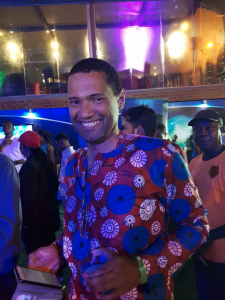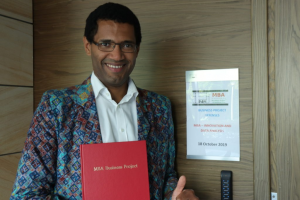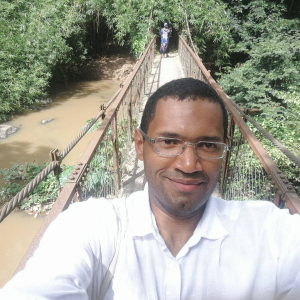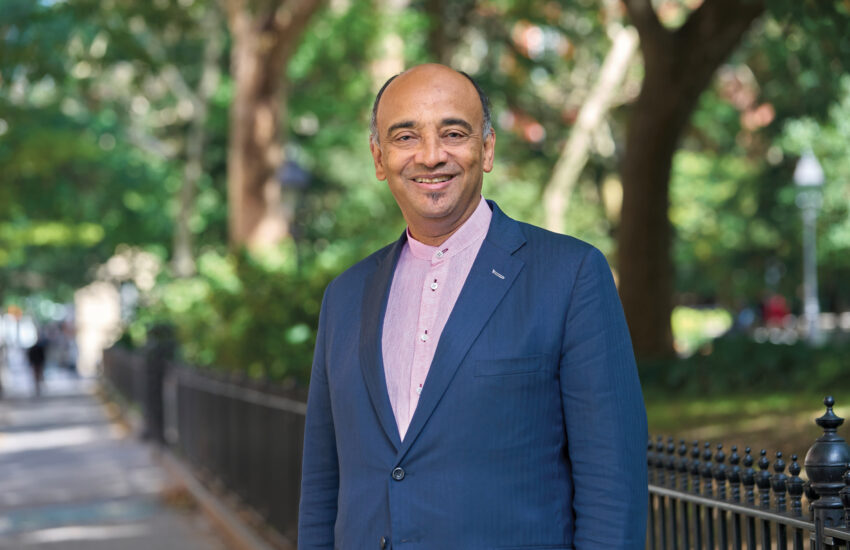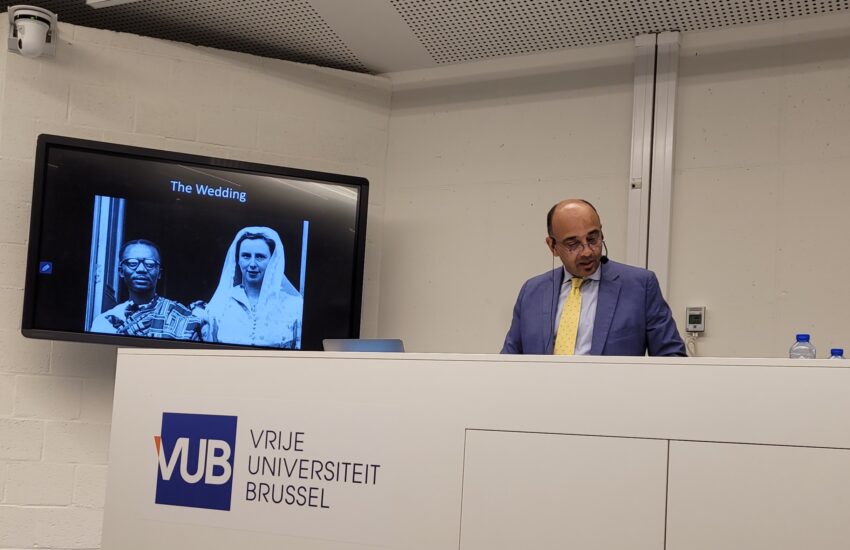In Liminal Space Part 5
Written by Nina Camara
In Liminal Space is a series of interviews in which I want to highlight the experiences of people who have decided to leave an environment which did not reflect their story, for a liminal space ‘between the known and the unknown’, in order to put their past behind them and create a new beginning somewhere else.
The journey of self-discovery is important for everyone, but if you are born into an environment where the most visible part of your identity and heritage is not reflected in the mainstream culture, sometimes it is necessary to go an extra mile (literally).
Born in Italy, Ilario had no role model or point of reference about black culture until his teenage years. Driven by the need to belong and define his identity, he decided to take an active approach and created his own blueprint to heal from “othering” and develop a strong sense of self.
Pt 1: Life Back Home
Describe the place where you grew up. What was it like in terms of cultural and ethnic make-up?
I was born in Rome in the early ‘80s. My mother is Italian and my father is Nigerian. I grew up with my mother and my Italian grandparents with no contact with my African side since short after my birth. My neighborhood and the school I attended was almost exclusively white so I had no references from African and Black cultures. My self-discovery into my blackness started in my teenage [years] when I got more and more into Hip Hop music. I also recall an important movie for my black identity formation, that was Spike Lee’s Malcom X with Denzel Washington, I became fixated with that movie.
How did you feel growing up in this community?
From an identity point of view, I felt extremely alone. From one side there was an homogeneous white group of which I completely shared the culture, the language and the values besides my physical look, and from the other side I had no presence or information regarding my African roots. Being the sole black child in the school, you get a lot of attention, and everything you do is amplified. Several times, I felt not accepted as part of “us”, from childhood till when I left the country in my adulthood. I felt like I had to justify my own existence, of how it was possible for me to be Italian, and when making a reference to my Nigerian ancestry the usual answer was “ah, ok, you are Nigerian”. In the teenage [years], I started being harassed by the then up-growing extreme right and frequently checked by the police on my way to the gym or home.
How did this experience influence your self-perception?
I have grown up with the feeling of being different. That had a negative but also a positive effect on me. If, from one side, it made me feel a foreigner in my own country, from the other side, it allowed me to distance myself from the social rules, expectations, behaviour of my culture and from the limits of my family situation. This helped me to look past limitations, and pushed me to explore more. At the age of 14, my curiosity brought me into Asian culture and spirituality. This happened as I have started practicing Asian martial arts for self-defense purposes. I am very grateful to myself that I have done that, it supported me a lot in my later journeys.
Pt 2: Leaving Home
At which point did you decide to leave Italy?
I left Italy in 2010. I wanted to leave earlier but I needed to stay next to a family member that was sick, ‘til a solution became available. I left for a series of reasons: job, love, identity and need of self-reflection. I would not say that I left solely for my identity journey, as with a lot of young (white) Italian graduates, a strong drive was the search for better job opportunities. I had in my mind to go to the Netherlands since my university time: good economic conditions, a multicultural society and just two hours flight from my home country were very appealing to me.
You spent a decade in the Netherlands. What was your experience as an Afro-Italian living in this country?
That is a nice question. What I appreciated from Netherlands is that my blackness was never subject to any kind of street micro-aggression, from useless check from law enforcement, to simply that I have never seen a lady hide her purse in my presence. The Dutch, being exposed to a history of colonialism, are accustomed to see Afro-descendants around. At least in big cities like Amsterdam and Rotterdam, where I have both lived. My otherness in the Netherlands became mostly my Italian origin. The “unpleasant episodes” I had were relative to what was happening in my government back home or based on stereotypes linked to Italians. Fun fact, the Dutch had no problem to see me as an Italian. However, my multicultural dream crashed when I realized that Dutch society is far from being an inclusive one (although they are trying) and that the country has not fully come to terms with its colonial past: this is reflected in the job market, in education and all the other aspects of society. Black Dutch are often foreigners in their own country, and I had it better than them several times just because of my Italian nationality. Living in the Netherlands, it has been a great experience that has taught me a lot. However, I left the country as I felt we gave each other all that we could. I brought with me a good dose of Dutch pragmatism, which I must say is very effective in several life situations.
Having moved to Ireland recently, how does it compare in terms of diversity and people’s behaviour towards you?
I have to say that most of my Irish experience happened during lockdown and Covid-19 restrictions. So far, I think that Irish people are warm, especially after they get the chance to know you and understand you are a good person. Compared to the Netherlands, Ireland is on the other spectrum of historical background: they have suffered from English colonialism and severe economic challenges. So, if from one side they are less used to seeing “diverse” people around the streets, and I am extremely sensitive to this, from the other side I perceive they are more willing to include “others” in their inner circles. However, as I said, I have just arrived, time will tell. Additionally, my need for “inclusion” decreased a lot as I have done quite some self-reconciliation. What brought me here is the vibrant Tech industry, which is my sector. So, this was a less “romantic” move compared to when I left Italy for the Netherlands.
Pt 3: Journey of Self-Discovery
You’ve done a lot of exploring to connect with the African part of your identity. Can you describe the experiences which helped you in particular?
Let’s look a this chronologically. When I was a teenager, what helped me was to get into the available “consumable” culture such as movies or music. Then, when I moved out of my home city to start my university studies, I had the first encounters with African foreign students and this helped me a lot, as I had the first real insights into the Continent. However, my path of reconciliation with my African side started when I moved to the Netherlands, especially in the latest years. I am not sure how this happened but suddenly, I have started craving more and more about Africa and put all my energies into this need of reconnection. I mostly used, travel, art and spirituality as mediums of reconciliation. At first, I have subscribed to Capoeira, the Afro-Brazilian fight art created by the enslaved African in Brazil. Capoeira came with a lot cultural clues that I have started picking up and it gave me the foundation to explore further. I have then started to join African dance courses, both modern and traditional. I have subscribed to Djembe drumming classes. I have traveled to Germany to attend Afro-Cuba workshops. From the Netherlands, I have discovered a network of Afro-Italians on social media that I had totally ignored, and I got busy with that, flying over to Italy to meet them and join online projects and meetings. Spirituality has been always important to me, from the time of my Asian martial arts training, and I have started being interested in traditional African spirituality as well, I have read books, met practitioners to learn from them, and visited sacred places in Africa and South America.
I have also decided that theatre could help me in this journey. I had to do something to showcase the depth of African culture, and in this way reconnect to that. With a group of wonderful and crazy people, we created a short performance that would present the Orishas, the Yoruba deities. We worked two years on that, studying the culture, creating the costumes, rehearsing. We had the chance to perform it twice: the first time in front of an African public in The Hague and the second time in front of a Dutch public in Amsterdam. I impersonated Shango, the God of Thunder and Lighting, to whom I feel more connected with.
Lastly, I have launched myself in a stand-up comedy show where I entertained my public on the (dis)adventures of being a mixed race individual. I had a lot of fun doing it, and often I go back to watching the recordings.
Travel. A very important part has been played by my travel to the African continent. I have started with Kenya, a wonderful country. This trip gave me the strength to visit Nigeria, for the first time. I have explored Lagos and traveled to the Yorubaland to pay homage to the Osun-Osogbo sacred groves. This trip clicked something in me and I came back home changed. After that I visited Cape Verde and Salvador de Bahia in Brazil. Bahia can be considered as the biggest African nation outside the continent. In Brazil, I have felt at home.
The art, sport, and travel were not yet enough. Therefore, I have decided that my final MBA project will be carried out in Africa. After some explorations, I have chosen Ghana. In summer 2019, I went to Ghana where I planned and delivered a sales acceleration project for more than 30 innovative Ghanaian start-ups. This can be considered my capstone project in my reconciliation journey.
How were you perceived and treated as an Afro-Italian in different parts of the Black diaspora?
This is controversial. Generally speaking, in Europe I am referred to as a “brother”, although the delineation of this varies a lot from country to country. In Africa, I have been mostly perceived as a foreigner or a “white” person. I did not get any special treatment from my peers and therefore I also became disillusioned from any concepts of ancestry-oriented brotherhood. The only brotherhood is the Human one, and it is as it should be, looking at each others for what we are without discriminations or privileges. I must say that I felt at home in Brazil and I am not sure if it is only because of the way I look.
What impact did your journey have on your identity and outlook on life?
The outset was not very easy. However, I am grateful for my mixed background and my history. It forced me to look beyond cultural paradigms. It gave me an opportunity to explore and research. The journey has enriched me a lot. Now, the outlook is positive, personally I feel I have come to terms with most of my reconciliation process and I see the world being more mixed every day. A boy born today in my own neighborhood in Rome will have a completely different narrative to tell in his adulthood. I would like to connect more with people like me, that use their mixed heritage as a springboard to explore more, instead of considering it a refuge. If you have a crazy project in mind, let me know! I am likely to jump in! Lastly, I want to thank Afropean, Mixed race peeps and Nina for creating the space for this.

